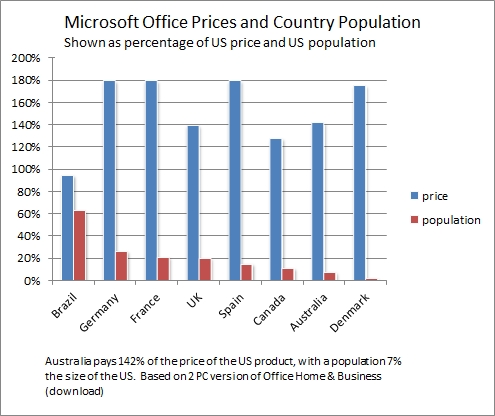By the numbers: price on our headcount

Senator Conroy's parliamentary inquiry into software pricing is on a hiding to nothing. Small countries will always pay more, and we're actually doing better than some.
There's no doubt that we're at a big disadvantage over those in the US when it comes to buying software. We highlighted this a year ago when Adobe launched its Creative Suite 5.5. Now, with the pricing released for Creative Suite 6, we can see that the problem still exists.
Microsoft is another big offender. The downloadable edition of Microsoft Office Home and Business edition (for two machines) is 42 per cent higher than in the US (at current exchange rates). In Microsoft's defence, countries like Australia (with one tenth of the US population) will sell far fewer products, and the company must still deal with marketing and support costs.
So, does this mean that the smaller the country, the higher the price for software? For the most part, the answer is yes. (Brazil seems to be the exception, but it is considered to be a developing economy.) Germany, a country with a quarter of the population of the US, pays 80 per cent more than those in Microsoft's homeland. Australia, with just 7 per cent of the US population, gets away with paying only 42 per cent more. (So maybe we should keep quiet?)

(Credit: Phil Dobbie/ZDNet Australia)
The truth is that Microsoft, like any company, will charge what it can get away with. What vendor wouldn't weigh things up by asking, "What will make more: selling fewer units at a premium price, or selling more at a lower price?"
There's nothing that Stephen Conroy's parliamentary inquiry can do to stop this from happening. It's a fundamental of business, and the repercussions of the government sticking its nose in and taking on some sort of regulatory control is frightening to all businesses, irrespective of their sector.
We should remember that higher pricing in Australia doesn't just relate to software. We pay more for most things — cars, petrol, clothes, toys. Shipping costs might be an element, but it's mostly to do with market size. Perhaps the conclusion from Conroy's inquiry will be that we should fix the pricing issue through a forced breeding program and a huge increase in our migration intake. That should do it.